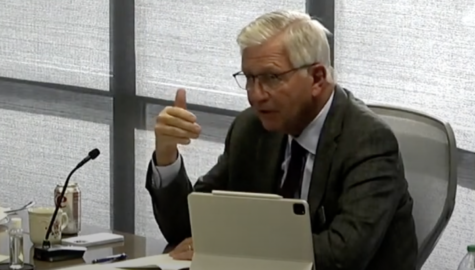Former CIETC CEO sentenced to 7 years in prison

Former Central Iowa Employment and Training Consortium CEO Ramona Cunningham walks to the Federal Courthouse before sentencing, Monday, Dec. 15, 2008, in Des Moines, Iowa. She and her co-defendants were accused of conspiring to misspend more than $1.5 million on huge executive bonuses and salaries from January 2003 to April 2006. (AP Photo/Charlie Neibergall)
December 15, 2008
DES MOINES (AP) — The alleged architect of a scam that prosecutors said involved more than $2.5 million in misspent money meant for a government-funded job training agency was sentenced Monday to seven years in federal prison.
Former Central Iowa Employment and Training Consortium CEO Ramona Cunningham and her co-defendants were accused of conspiring to misspend millions on huge executive bonuses and salaries from January 2003 to April 2006. Cunningham was pegged as the ringleader of the operation.
During a plea hearing last summer, she admitted diverting federal funds to her own pocketbook and to a handful of her colleagues. She pleaded guilty to eight of the 30 federal charges she initially faced. Officials said the eight counts represent each of the federal funds that were defrauded or otherwise misapplied.
“I am very sorry and I want to apologize for everything I have done and every one I have hurt,” Cunningham said Monday.
She was taken into federal custody immediately after the hearing.
Judge Robert Pratt told Cunningham that the sentence he was imposing “is meant to send a signal to public and private CEOS” that abuse the public trust.
“The defendant has abused that trust,” he said.
Prosecutors and Cunningham’s attorney, Bill Kutmus, sparred for hours Monday in federal court over the type and length of sentence. Kutmus wanted to see Cunningham receive home detention or time at a halfway house, while prosecutors requested that she get 10 or more years in prison.
U.S. attorney Matthew Whitaker said Cunningham was a central player in the scheme and that he was satisfied with the sentence. He noted that “at least this piece of the CIETC scandal is put behind us.”
“Although we would have preferred 10 or more years, seven is a sentence we can accept,” he said during a news conference following the hearing.
Prosecutors are also are asking for about $2.4 million in restitution, but confusion on the court’s part whether that figure included justified salary earned by Cunningham and others means more proceedings must be held to decide restitution.
Kutmus argued that his client didn’t abuse the public trust or obstruct justice and blamed another CIETC official, former Chief Operating Officer John Bargman, for serving as the ringleader of the scam. He said the excessive salaries and bonuses didn’t happen until Bargman was hired at CIETC.
“Ms. Cunningham’s role was far, far less than the role of Mr. Bargman,” he said, adding later that, “From the very outset, after Ramona Cunningham was indicted …. the United States did not treat Ramona Cunningham fairly in contrast, in comparison of its treatment of John Bargman particularly.”
Pratt agreed, saying “I think Mr. Bargman and Ms. Cunningham were equally culpable.”
Telephone messages for attorneys listed as representing Bargman weren’t immediately returned.
Kutmus noted that Bargman’s plea agreement calls for only about three years in prison, and alleged that Cunningham was the subject of unjust punishment because she’s a woman.
“It is my opinion that the government’s harsh treatment of Ramona Cunningham has a faint whiff of sexism,” he complained of prosecutors.
They denied the insinuation.
“It’s completely false,” Whitaker said at the news conference. He added later that, “I think Mr. Kutmus was making arguments in the best interest of his client and may not be in the best interest of the truth.”
At a mental competency hearing in May to see whether Cunningham was fit to stand trial, a psychiatrist testified that she suffered from major depression and had “overdosed on handfuls of medicine” during a suicide attempt. Part of why she was immediately taken into custody after Monday’s hearing was for her own protection, the judge said.
Cunningham’s daughter testified that her mother had already punished herself for three years, since the case was widely publicized, and suffered public humiliation.
“It was like she polarized all the hurt in this state and she became a figurehead for every verbal attack that one can imagine … it was intense, it was humiliating and it was mostly focused on her,” said Kelly Ayers. “She was so ashamed she couldn’t even breathe.”
At Cunningham’s co-defendants’ trial in April, jurors convicted Karen Tesdell, a former CIETC treasurer, of all 29 counts against her. Former Iowa Workforce Development supervisor Jane Barto was found guilty of one count of obstruction but acquitted of a conspiracy charge. Dan Albritton, a former board member and Cunningham’s boyfriend, was acquitted of a count of conspiracy.
Tesdell is scheduled to be sentenced Tuesday. Barto will be sentenced on Dec. 22.
Bargman and former CIETC Chairman Archie Brooks have pleaded guilty to various charges and agreed to cooperate with federal authorities, including testifying against others in the case. Their sentencing dates have not been set.
















